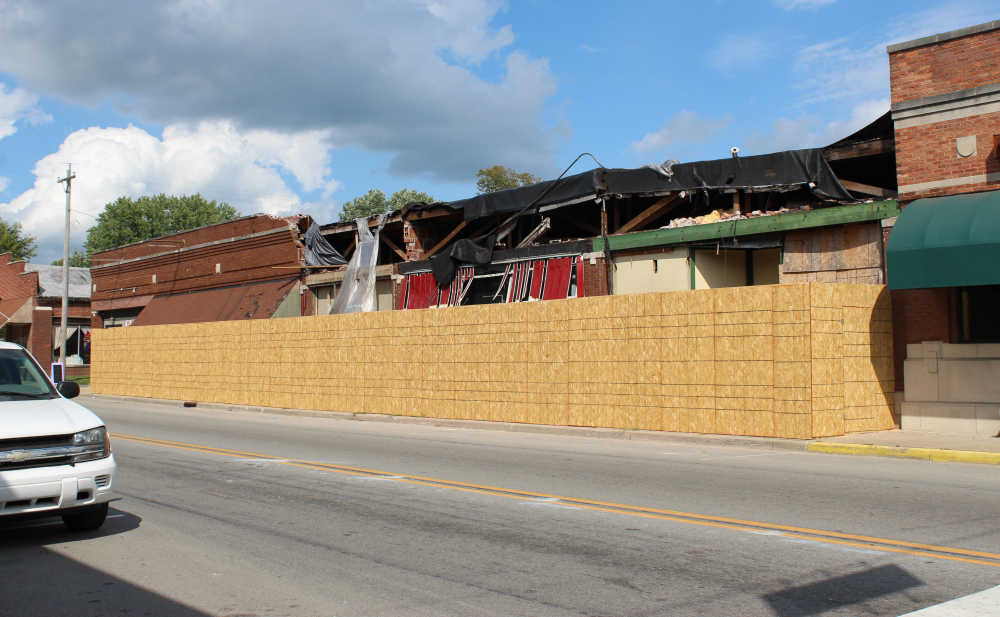Downtown Cloverdale owners protest citations

CLOVERDALE -- The meeting space in the Cloverdale Town Hall was at capacity Tuesday evening as both Town Manager Wayne Galloway and Town Attorney Daniel Hoffman came under fire with regard to recently issued non-compliance citations.
The owners of four buildings on Main Street, which sustained wind damage earlier this year, came before the Cloverdale Town Council with complaints that these citations were unfair. They also charged that Galloway and Hoffman did not provide pertinent information so that repairs could move forward.
The disagreements came down to Hoffman saying they were the owners’ responsibility while criticizing their seeming inaction. The owners put the issue down to a lack of willing communication from both Hoffman and Galloway, as well as not being allowed time or provided the necessary information to make improvements.
Taking on more of a role as a mediator between the town and the audience, Hoffman first called Galloway to provide his perspective on communications between himself and the property owners to the present.
Galloway said after the roof collapse at the end of February, he called a meeting with the owners on Friday, March 1 to discuss next steps for making repairs. He claimed he provided information regarding applications for a construction design release (CDR), which would need to be sent to the State Fire Marshal’s Office with plans drawn up by an architect.
Galloway said no significant repairs had been done to either of the properties as such. However, he added that Kim Fidler, who owns one of the damaged properties, had kept in touch with him regularly since the incident.
Galloway also addressed the reasoning behind erecting a wooden barricade in front of the buildings, stating that debris was continuing to fall from the damaged roof. He also said two independent engineers had been brought in to analyze the damage, and that one had determined that the buildings were repairable. He added he was waiting on the other’s determination.
The first property owner to speak began that he had brought in architects and insurance to survey the damage to his building. He said he had repeatedly tried to contact Galloway to meet with him, but got no response.
He further said he was told the interior walls could not be rebuilt, and that work on the building was at a standstill due to financial constraints.
He referred to certified letters sent from Hoffman as “threats,” and said he didn’t know what to do at this point despite the pressure from the town to act.
Fidler, who presented her case more fully despite Hoffman’s time limit of four minutes, said she had made headway on repairing her building both before and after the roof collapse. She said she had installed a door and lock to prevent vandals from the entering the premises, which was already boarded up.
When the incident occurred, she found that one corner of her building was exposed. Fidler said she was able to get power restored, but she couldn’t get a building permit. She pressed Hoffman and Galloway as to why she also wasn’t told about a CDR, even though she had provided plans which she had drawn.
Fidler advocated the she had complied with the town’s requests and had in fact kept in touch with Galloway, as well as kept documentation of purchases and correspondence.
However, Hoffman repeated that Fidler was still not in compliance with submitting plans or obtaining a building permit. Fidler read from a letter sent from Hoffman, balking at a suggestion that she could “give” her building away, and then buy it back.
In a back-and-forth accented by murmurings from the audience, Hoffman stated that concerns brought by Fidler and others were their opinion, and that Galloway “wasn’t the culprit” for not repairing the buildings. He repeated that Galloway could not issue a building permit without a CDR and an architect’s plans. Hoffman also kept asking what the property owners had done.
The last property owner to speak said he had purchased his building in April. He stated that he was not given a timeline by the town to make repairs, though an architect had looked at the building. He also said that he had never been told about submitting a CDR until that Tuesday.
Ultimately, in a moment of reconciliation, the first property owner to speak asked if the citations could be “shelved” to allow all involved to “get on the same page” as to what needed to be done.
Though the sparring between the property owners and both Hoffman and Galloway had raised tensions, an agreement was reached that better communication was needed.
Council President Larry Fidler suggested the owners attend next month’s session after meeting with Galloway. It was unclear whether the standing citations would be disregarded for the time being.
Galloway also said because the buildings could be considered historic, the requirements to restore them to their original state as such would not be needed if the property owner did the repair work.
In new business, the council approved a handful of resolutions concerning the town’s finances.
After a second reading it passed Ordinance 2019-7, which addresses town employee and personnel salaries to account for recent resignations from the town office and Cloverdale Police Department. At-large member Gary Bennington opposed the approval.
In a non-verbal vote, it was assumed that the council also passed Ordinance 2019-8 to adopt the budget for 2020. The council also approved Ordinance 2019-4, which allowed for the disbursement of the budget to include for sale of three police cars and purchasing a 2019 police truck.
Don Sublett was the only council member absent at Tuesday’s meeting.
The next regular meeting of the Cloverdale Town Council is scheduled for Tuesday, Oct. 8 at 7 p.m. in the Cloverdale Town Hall.
